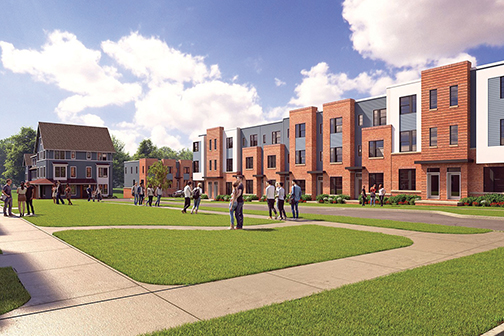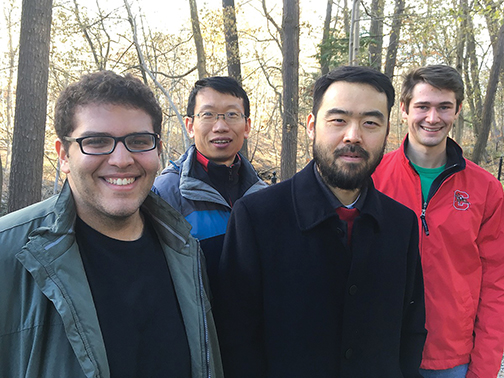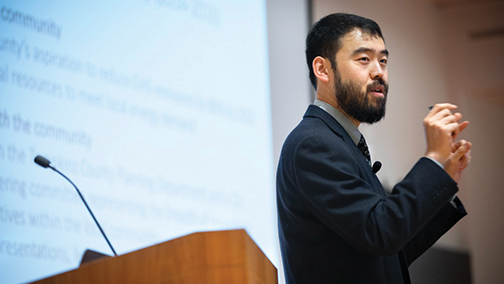Max Zhang aims for impact in Ithaca and beyond
By Chris Dawson
When Max Zhang, associate professor of mechanical and aerospace engineering, first interviewed at Cornell, he was inspired by a particular conversation he had about the environment and about community engagement.
He had spoken with Zellman Warhaft, a professor emeritus well known for a course he taught for many years called “Components and Systems: Engineering in a Social Context.”
“When I spoke with Zellman it was clear that Cornell would be a good place for me to work,” says Zhang. “My work is not typical MechE stuff. But Zellman’s work at Cornell set a good example.”
Growing up in China, Zhang originally wanted to design cars and engines. “But then during my undergraduate years I visited Beijing,” says Zhang, “and I saw firsthand the ugly side of cars and emissions.” These visits had a big impact on Zhang and led to a change in focus. “Seeing Beijing before there were any air quality regulations made me want to do something different in grad school than design cars,” says Zhang.
Zhang went to the University of California, Davis for his doctoral studies and worked with Professor Anthony Wexler on near-road air pollution. “I feel fortunate to have gone to UC Davis and to have worked with Tony Wexler,” says Zhang. “Good mentors inspire, and he definitely inspired me to want to make an impact.”
In a one-hour conversation with Zhang, the word “impact” came up no fewer than 10 times. It is clear that it is important to Max Zhang that his work matters—that it has a positive effect in the real world as soon as possible.
Zhang’s doctoral work with Wexler and other researchers showed, among other findings, that people living or working within 90 meters of a busy freeway in California were exposed to particles that other people living and working farther from the freeway are not. Their results were cited when California passed a law prohibiting the siting of new schools near freeways.
Once Zhang joined the Sibley School of Mechanical and Aerospace Engineering faculty, he continued to ask research questions whose answers could inform policy and behavior right away, including in the greater-Ithaca area. Since his arrival at Cornell in 2006, Zhang has published more than 50 scientific papers on topics such as emissions from diesel vehicles, influence of solid noise barriers on near-road and on-road air quality, and roadside vegetation barrier designs to mitigate pollution impacts.
In April 2017, Cornell’s Office of Engagement Initiatives recognized Zhang’s relentless focus on impactful research by awarding him the Engaged Scholar Prize. The prize recognizes a faculty member “whose innovative approaches to connecting community engagement and scholarly activities stand out and serve as inspiration to students, colleagues and community partners alike.”
When Zhang received the prize he commented, “I really believe there is a synergy between community engagement and research. Engaging communities and addressing real-world problems has motivated me to conduct research that has societal impact.”
Thinking and acting locally

An excellent example of Zhang’s engagement in the community is his work on the Tompkins County Energy Roadmap.
In 2014, Tompkins County—where Ithaca and Cornell University are located—called for a proposal that would guide the county to an 80-percent reduction in greenhouse gas emissions by the year 2050. Zhang led a committee of 12 people from various Tompkins county stakeholder groups in the long, difficult work of, in their words, “creating a framework to guide activities and energy-related decision making to achieve long-term-energy demand and climate goals.”
At first, Zhang thought the work on the energy roadmap might take six months. Then he thought maybe a year. Then one year became two.
“At the same time,” says Zhang, “I was teaching a class that required the students to have projects, so I thought that I, too, should have a project. It only seemed fair.”
The group’s final report was submitted to the Tompkins County Legislature in April of 2016 and was accepted by a unanimous vote. In the life of an academic, two years devoted to a project that is unlikely to result in any published academic papers is a huge risk. But Zhang says that the risk paid off handsomely.
“I really know the community now—I am part of the place both personally and professionally. I feel like I belong here now after living in Ithaca for more than 10 years,” says Zhang. “And the thing is, I never expected my work on the energy roadmap would generate new research ideas, but it has. In fact, I have had two grants grow from this project.”
The first is a grant from the New York State Energy Research and Development Authority and it funds Zhang’s research into air pollution resulting from wood smoke in the City of Ithaca. Due to this work, Zhang has helped individual Ithaca residents reduce the volume of pollutants leaving their chimneys simply by informing them of some facts about wood. Wood that is in large pieces and not allowed to age for a season or two releases more smoky soot when it burns than does wood that is split into smaller logs and allowed to dry. Parts of Ithaca’s Fall Creek neighborhood have a seen a measurable reduction in airborne particulate from wood fires after Zhang’s intervention.

A second line of research growing out of Zhang’s work on the energy roadmap has been funded by the National Science Foundation (NSF). In it, Zhang has partnered with a local apartment complex to study the effectiveness of heat pumps as a primary source of temperature control.
“It is a 400-unit complex and they have no natural gas,” says Zhang. “We are building a wireless energy monitoring system to gather community data and see how we can maximize efficiency.”
Another NSF-funded project Zhang and his students are working on to improve the air people breathe is called Green Heart. The Green Heart project is designed to help Louisville, Kentucky, mitigate the health effects of having three major interstate highways traverse the city. But its long-term benefits will be replicable in other cities affected by car and truck emissions.
Zhang and his group are developing a computational fluid dynamics model to help Louisville determine the best placement for 12,000 trees they will be planting in the next five years. Ph.D. candidate Khaled Hashad explains, “We will be modeling trees and other vegetation, while exploring different designs and ways to scrub the particle pollution. For the next five years, we’ll be examining the space between trees in mitigating pollution from the highway, finding the best species and assembling a model to determine which trees belong where. And then we’ll measure the model’s efficacy.”
Of course, what they learn in Louisville won’t stay in Louisville. It could then be applied in communities around the world. As always with Zhang, the work is about the impact.
“This model, I believe, could foster interdisciplinary partnerships among different fields—such as air quality and transportation managers, landscapers and urban planners—in solving transportation and air quality problems.”
Many of Zhang’s students can’t help but be inspired but their work with him. While earning his undergraduate degree from Cornell, Michael Fradette ‘08 was involved in a group project led by Zhang.

“The real-world project and community engagement experience inspired our passions for sustainability, and greatly shaped our career development. Five of us are now working in the renewable energy industry, three in sustainable design firms and two receiving Ph.D. degrees in sustainable energy systems. For me specifically, this experience was not only the foundation of my career, but more importantly, it gave me the confidence to leave a job after only three months in pursuit of growing the sustainable energy sector,” says Fradette, who is now a project development manager at SunPower Corporation, which designs and manufactures solar panels.
It seems like everywhere Zhang looks he sees the possibility for community engagement. “The real world is messy,” says Zhang, “and because of that, there are a lot of places a researcher can have an almost-immediate social impact.”

